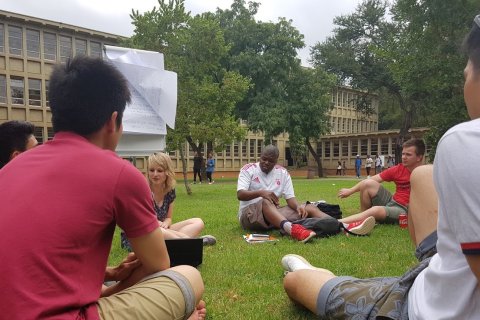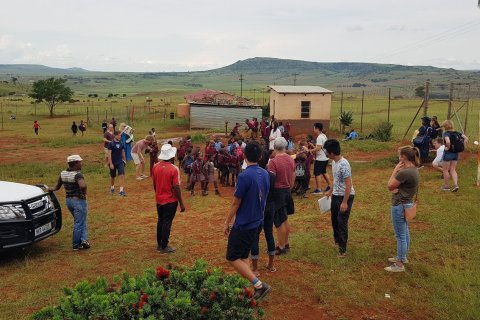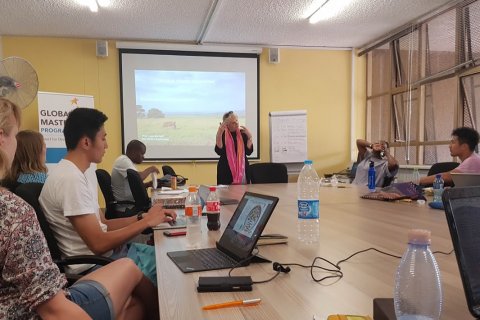First edition Global Sports Master completed in South Africa

The first edition of the international Global Master’s Programme - Sport for Development was completed with an intensive month in South Africa. After previous visits to the Netherlands and Japan, the students experienced enormous personal growth, says Sofie van den Hombergh, Programme Coordinator and Counsellor, who gave the students intensive guidance. One of the Japanese students said: "I am now 'Global Japanese'" and I think they can all say that they are 'Global Dutch' or 'Global South African' now.' The universities involved (Johannesburg, Tsukuba and Utrecht) would like to further develop the international honour’s programme after this first edition and make it structural and financially sustainable.
Sofie van den Hombergh and Frank van Eekeren, together with Mario Nishihara involved in the Global Master's Programme on behalf of Utrecht University, would like to turn it into an internationally accredited programme, for which students from all over the world can register at one of the involved universities and follow modules in Japan, the Netherlands and South Africa. This would increase the diversity of the students even more.
Frank van Eekeren: 'With this programme, we have already achieved something that seemed totally impossible. Two and a half years ago, many people said to us: do you really believe this could work out? But in fact, the ideas have been put into practice and came out even better than we had thought.'
Educating global citizens and leaders in sport
The Global Master's Programme - Sport for Development aims to educate students to become global citizens and future leaders in sport. Not only through knowledge of local, regional and international issues and academic knowledge of the meaning of sport in different contexts and of managing and governing sports organizations. But also by giving them training in professional skills such as leadership and management. In this way they can help (international) sports organisations to contribute to processes of social change, such as better health, more equality and less poverty, in a critical way and with insight into practice.
'Research can be done in many ways, it is not to be qualified as 'good' or 'weird'. The awareness of this has grown.'
How was the month in South Africa? What did the students do?
‘The last month with the students in South Africa was extraordinary,' says Sofie van den Hombergh, 'obviously because of the country itself, where, for example, the differences between rich and poor are much bigger than in the Netherlands and Japan. But also because of the big differences between white and black, and the heavy burden of history, in which the Netherlands plays a role. As a result, the students were asked in-depth questions about their own presence; for example whether they could actually be meaningful with their insights and advice in that particular context.'
Frank van Eekeren adds: 'The programme was full circle now. This group has known each other for a year and had already spent two intensive months together (in Utrecht and Tsukuba). Everyone had seen each other in their own and in a completely different environment. We could now see the impact of this: they could make a comparison. That was really an essential part of the programme. The month in South Africa added an extra dimension. The students have all gone through a tremendous development. And during this visit there was a lot of time they could spent together, in a remote area, so there was a lot of time to reflect.’
What exactly is the development that the students experienced?
‘I noticed that they have grown strongly in terms of cultural sensitivity, or rather: in terms of sensitivity in general,' says Frank van Eekeren. ‘Of course, they have gained a great deal of substantial knowledge and have learned about the other countries, but they have also gained a much better sense of the context in which they operate themselves. About the culture, the company in which they work, about the formal and the informal processes. Of course it is of help when you know the history of a country, but much more so if you understand that everyone is different.
For example, we had a closing symposium in South Africa, in the presence of the Japanese and Dutch ambassadors. The students understood that the symposium had a certain formal meaning. However, one of the students noted that the Japanese ambassador took a few steps away from the pulpit during the meeting, to indicate that, as far as he was concerned, the symposium could be a little less formal. This was perceived by them as a special moment. It may be just a small example, but for me it indicates that they have grown in this respect.
Sensitivity means: not judging too quickly, empathizing with the other person, thinking much more about what context you are in, and how you can solve things together. This requires flexibility, because in a different environment you are confronted with your own values, culture and you have to relate to different context.
For example, for some, ethics in research means keeping one's distance, remaining neutral, while for others it means trying to be meaningful in society and giving something back, i.e. interfering in a community. Research can be done in many ways; it is not to be qualified as 'good' or 'weird'. The awareness of this has grown, that was a great development.'

You also want to give something back to the community
What do you mean by "giving something back"?
‘In the first week the students were trained in the Football for Peace Programme, so that they could also provide international training for children. That's what they used to do at Early Childhood Development centres in Geluksburg, in the South African countryside,' says Sofie van den Hombergh. ‘During this period, they did research for a social enterprise to strengthen the region, which resulted in very specific recommendations. For example how to recruit, train and deploy volunteers in order to strengthen the social enterprise and give people the opportunity to develop themselves, as a prelude to a paid job.'
One of the students, together with a professor, conducted research in the possibilities for girls to participate in sports in the rural area around Geluksburg. However, there was no competition for girls yet, even though they were very keen to play sports. The South African professor Cora Burnett interviewed the local councilor together with her about the possibilities. But that's not all. After the interview she asked him to sign for the establishment of a girls' team. At first he didn't want to, but when the professor pointed out to him that local elections were about to take place and that this might result in more votes, he signed. According to Cora Burnett, this was an example of a South African way of research: not only ‘mining data', but also to give something back to the community immediately'.

March 2019, South Africa
In February 2018 the students were introduced to each other in Utrecht and apart from lectures and working visits they were mainly trained in academic and intercultural skills. In the Japanese part of the programme, in July/August 2018, they zoomed in on personal leadership and effectiveness. In South Africa, March 2019, group leadership was the main theme. In addition to training on group leadership and feedback, all students gave a workshop on a related subject. For example about teamwork, intercultural sensitivity or team building - how can you make sure that everyone feels welcome in a group? They were given more responsibility, had to set goals and organise the workshop themselves, present it and ask for feedback.
In Johannesburg they attended lectures on sports sociology, coaching, racism and sports, indigenous games, and the meaning of sport for development.
In the third week the group went to Geluksburg and the students conducted very intensive research in local schools, the Early Childhood Development centers, families and small (social) enterprises. In addition, they received lectures and skills training. A number of reflection sessions also took place: their experiences were quite exciting for the students and in a quiet setting the students shared these with each other. They also reflected on the similarities and differences in the experiences.
In the fourth and last week the students wrote and prepared articles and presentations for the symposium. For example about mobilising and supporting volunteers to keep them involved in sports lessons at school. Or about the possible stronger effect of school sports compared to competitive sports.
‘In addition to the skills and substantive knowledge of sport for development, the students have indeed also given something back to the community in all three countries,' says Frank van Eekeren. ‘And what also made the programme full circle: in the month in South Africa they paid a lot of attention to academic skills. It's not just about being able to give advice, but also about being able to substantiate this theoretically and perhaps even add something to a certain theory, recorded in the form of a research paper. This has given the students a very wide range of skills.’
These students are the first GMP students and therefore also the first alumni. That is why we are keeping them involved in the further development of the programme.
What will happen next?
‘We have been able to organise this first edition with additional funding from the three universities involved,' Van Eekeren continues. ‘We want to make the programme financially sustainable and grow towards an internationally accredited programme, a so-called structured mobility programme. Students would then come from these three universities and be able to follow modules in the other countries. In addition, if students who register at these universities come from Germany, Sweden, Cambodia or Korea and so on, the diversity will be even larger.
In the meantime, we want to build on the experiences we have now and organise exchange programme’s and summer or winter workshops. We will start this summer with a workshop in Japan, in cooperation with our partner university in Eindhoven.
Just like this time, we want to keep the costs for the students low in the future, so that we can maintain the diversity within the group and not only well-off students can participate in the programme. This means that we are looking for external financial support. It is possible that IOC or UNESCO might co-finance scholarships'.
I can no longer visit a sports organisation in the Netherlands without meeting a former student of the UU master's programme Sports Policy and Sports Management. We wish the same for this programme, internationally.
Ambassadors who can make a difference
‘The students of this first group now call themselves the 'GMP family', says Sofie van den Hombergh laughing, 'and they are making plans to see each other again, for example during the Olympic Games in Tokyo, in 2020. They are the first generation of GMP students and therefore also the first alumni. That's why we're keeping them involved in the further development of the programme. If we travel to these countries again, they will have a role to play: as mentors, for example, or in bringing up issues, and for the visits of organisations and companies for which they work'.
‘They are now ambassadors of the Global Master's Programme,' says Frank van Eekeren. ‘And I hope it goes the same way as with the master's programme in Sports Policy and Sports Management at Utrecht University. I can no longer visit a sports organisation in the Netherlands without meeting a former student of that master's programme. We wish the same for this programme, internationally. So I think it's great to see that the students already feel the responsibility to propagate the social significance of sport in their organizations, even in very commercial environments. They can make a difference. It has always been our dream to influence bottom-up, by people who see the social significance of sport, who can support it, who know how to handle in different and difficult situations and who can help others with that.'

